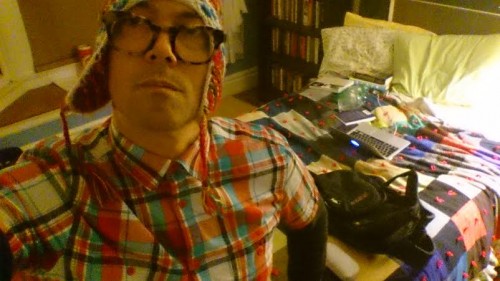
Summer Reads continues w/ Janey Smith…
***
Content Warning: Six Books You Shouldn’t Read | Janey Smith
Janice Lee asked me to list six books that everyone should have on their summer reading list. Warning: These books will not affect you in any way.
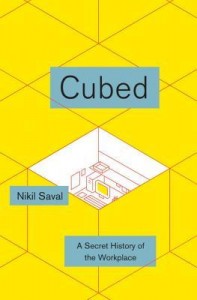 1. Cubed: A Secret History of the Workplace by Nikil Saval (Doubleday, 352pp)
1. Cubed: A Secret History of the Workplace by Nikil Saval (Doubleday, 352pp)
Nikil Saval has written a book about the secret history of office work, which is great because tedious, numbing work and near total isolation make my day—five days a week. To be honest, I really like office work. Like so much of social life, it’s a lot like acting. It’s repetitive and I know exactly what I’m going to get if I behave a certain way. Besides that, I like to copy people and the things they do. I make awkward postures all day. When someone asks me how my day at work was I always say the same thing, “I don’t remember.” That’s what makes office work so great. I don’t remember any of it. I mean, I do remember some things like where I put my stapler, but I do the same thing everyday. I hear people say that office work is so boring but it’s not. When I’m at the office I daydream a lot and I always think of things to do that are bad. I really like office work. Without it I would never get bored.
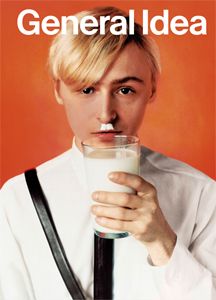 2. General Idea: A Retrospective 1969-1994 (jrp | ringier, 224pp)
2. General Idea: A Retrospective 1969-1994 (jrp | ringier, 224pp)
Most of the time I have no idea what art is. So it’s nice to know that Felix Partz, Jorge Zontal, and AA Bronson had a general idea of what it was. Eschewing a politics of identity and freed from the tyranny of individual genius—they considered themselves a trouple—General Idea took credit for everything it did as if it were one body, and not three. Furthermore, most of their shows were free. General Idea was really great. They understood that to be a great artist you had to be glamorous, act famous, and mix up fiction and reality. Everybody seems to think that you have to make things to be an artist but you really don’t. All you have to do is host beauty pageants, paint poodles blue, and put AIDS posters up in your neighbor and you, too, can be an artist. The best thing about General Idea is that they adopted a generic identity, which is great because to have no personality—or even multiple ones—is better than to have one personality.
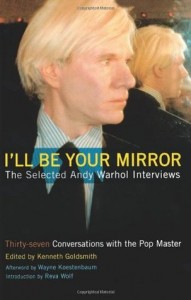 3. I’ll Be Your Mirror: The Selected Andy Warhol Interviews Edited by Kenneth Goldsmith, Introduction by Reva Wolf, Afterword by Wayne Koestembaum (Carroll & Graf, 428pp)
3. I’ll Be Your Mirror: The Selected Andy Warhol Interviews Edited by Kenneth Goldsmith, Introduction by Reva Wolf, Afterword by Wayne Koestembaum (Carroll & Graf, 428pp)
I really like Kenneth Goldsmith. He takes all the things an office worker does and uses that to make poems. And like most office workers he dresses really badly, which is great because poets get a bad rap for spending all their temp-job money on expressive clothes. But anyway, did you see that costume he wore at the White House? If I were president of something, I would have had him arrested for crimes against mundanity. It was really that bad. A total fashion atrocity. Goldsmith resembled a circus clown on LSD, which would have been really great had he done something incendiary to tip the scales in the war on income inequality. Instead, he read a poem about a bridge. Governor Christie seemed pleased. I’ll Be Your Mirror is a great book—thirty-seven selected interviews with Andy Warhol, each one demonstrating Warhol’s art of giving an interview—but Goldsmith should look in the mirror once in while and say, “No. I’m not going to do it,” and put his pajamas back on and pretend it’s the 1990s. Or better, hire a fashion consultant—someone, like Vanessa Place or Kate Durbin, who knows how to dress—after all, he can afford it with his professor’s salary.
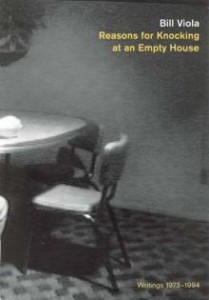 4. Bill Viola: Reasons for Knocking at an Empty House: Writings 1973-1994 (MIT, 300pp)
4. Bill Viola: Reasons for Knocking at an Empty House: Writings 1973-1994 (MIT, 300pp)
Anytime Marjorie Perloff praises someone I want to remind her that I love wigs as much as Nada Gordon but Perloff’s no Andy Warhol and that mop atop her head looks awful. (To be fair, I acquire almost anything Perloff’s name is associated with.) The only reason I picked up this book is because Bill Viola writes about a cow on page 86.
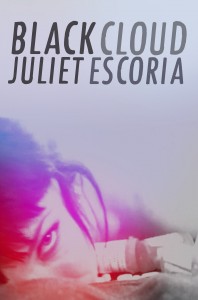 5. Black Cloud by Juliet Escoria (Civil Coping Mechanisms, 138pp)
5. Black Cloud by Juliet Escoria (Civil Coping Mechanisms, 138pp)
Juliet Escoria writes really great stories about summer romances. The formula is simple: Two people meet, they do all this crazy fucking, then everybody’s throwing up and screaming at each other. What’s neat is that the drama of heavy drug use which makes every story in this collection seem like a trailer park debutante ball obscures the mental illnesses that so many of the characters suffer. And so, in a way, it reminded me of Facebook: a fiction that advertises its characters illnesses in such a way that it’s easy to like it. But something else really important—something like office work—is also going on here: Juliet’s book is like a play, or a bunch of skits, like something we do when we’re at the water cooler at work except in Juliet’s play nobody is acting and everyone is falling apart. I asked Juliet how she wrote her book and she looked at me and didn’t say anything. When I asked her what time she gets up in the morning she said early. When it gets really late at night and I’m on drugs I feel sick. I think black clouds are beautiful.
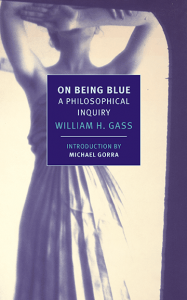 6. On Being Blue: A Philosophical Inquiry by William H. Gass (nyrb, 91pp)
6. On Being Blue: A Philosophical Inquiry by William H. Gass (nyrb, 91pp)
William H. Gass is a famous intellectual. On Being Blue is an entire book about the color blue, which is great because somebody is going to have to know how to put blue back together after the oceans and the skies disappear. What’s funny is that I didn’t feel anything when I read this book. When I see blue I kind of go blank. So, while reading this book I also went blank. It was a great book. Now I know why I like to stare at the sky for a long time. It’s so ugly. One time I tried to think of something and I couldn’t think of anything. The only time I’m sad is when I don’t have any money. Being blue is something like that. There’s a whole ten pages on pubic hair. The best kind of philosophical inquiry is one with lots of fucking. This book is mostly porn. The cover is purple.
***
Janey Smith is a writer in San Francisco. His work will appear in the anthology 40 Likely To Die Before 40: An Introduction to Alt Lit. He hosts Live at 851: A Reading Series in San Francisco.

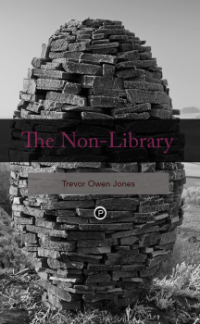 The Non-Library
The Non-Library

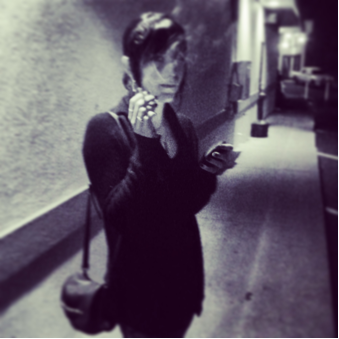
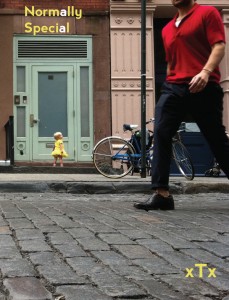 Normally Special by xTx
Normally Special by xTx The End of the Affair by Graham Greene
The End of the Affair by Graham Greene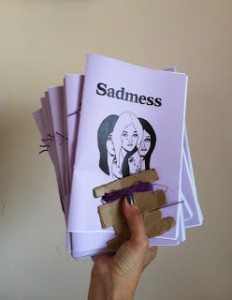
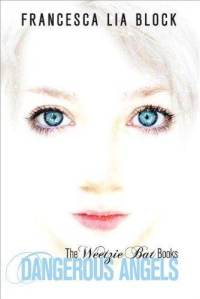 Dangerous Angels by Francesca Lia Block
Dangerous Angels by Francesca Lia Block We the Animals by Justin Torres
We the Animals by Justin Torres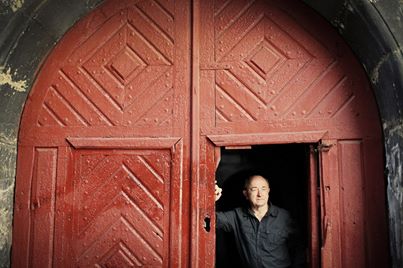
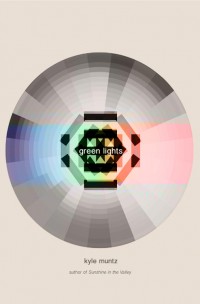 Green Lights
Green Lights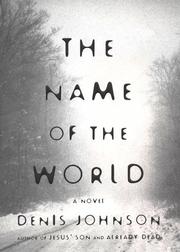
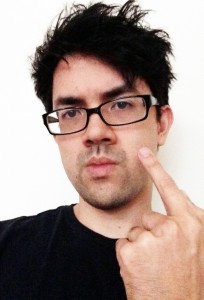

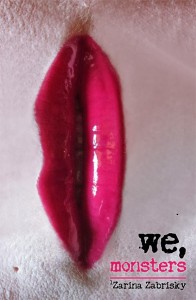 4. Wrote a fake philosophy book from the point of view Dr. Michael H. Strong to master his personal writing style. The book is called Survival and Procreation. The world will never see it.
4. Wrote a fake philosophy book from the point of view Dr. Michael H. Strong to master his personal writing style. The book is called Survival and Procreation. The world will never see it.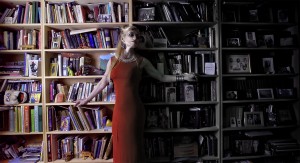 Zarina Zabrisky is the author of short story collections IRON (2012, Epic Rites Press), A CUTE TOMBSTONE (2013, Epic Rites Press), a novel We, Monsters (2014, Numina Press), and a book of poetry co-authored with Simon Rogghe (forthcoming in 2014 from Numina Press). Zabrisky started to write at six. She earned her MFA from St. Petersburg University, Russia, and wrote while traveling around the world as a street artist, translator, and a kickboxing instructor. Her work appeared in over thirty literary magazines and anthologies in the US, UK, Canada, Ireland, Hong Kong, and Nepal. A three-time Pushcart Prize nominee and a recipient of 2013 Acker Award for Achievement in The Avant Garde, Zabrisky is also known for her experimental Word and Music Fusion performances.
Zarina Zabrisky is the author of short story collections IRON (2012, Epic Rites Press), A CUTE TOMBSTONE (2013, Epic Rites Press), a novel We, Monsters (2014, Numina Press), and a book of poetry co-authored with Simon Rogghe (forthcoming in 2014 from Numina Press). Zabrisky started to write at six. She earned her MFA from St. Petersburg University, Russia, and wrote while traveling around the world as a street artist, translator, and a kickboxing instructor. Her work appeared in over thirty literary magazines and anthologies in the US, UK, Canada, Ireland, Hong Kong, and Nepal. A three-time Pushcart Prize nominee and a recipient of 2013 Acker Award for Achievement in The Avant Garde, Zabrisky is also known for her experimental Word and Music Fusion performances.